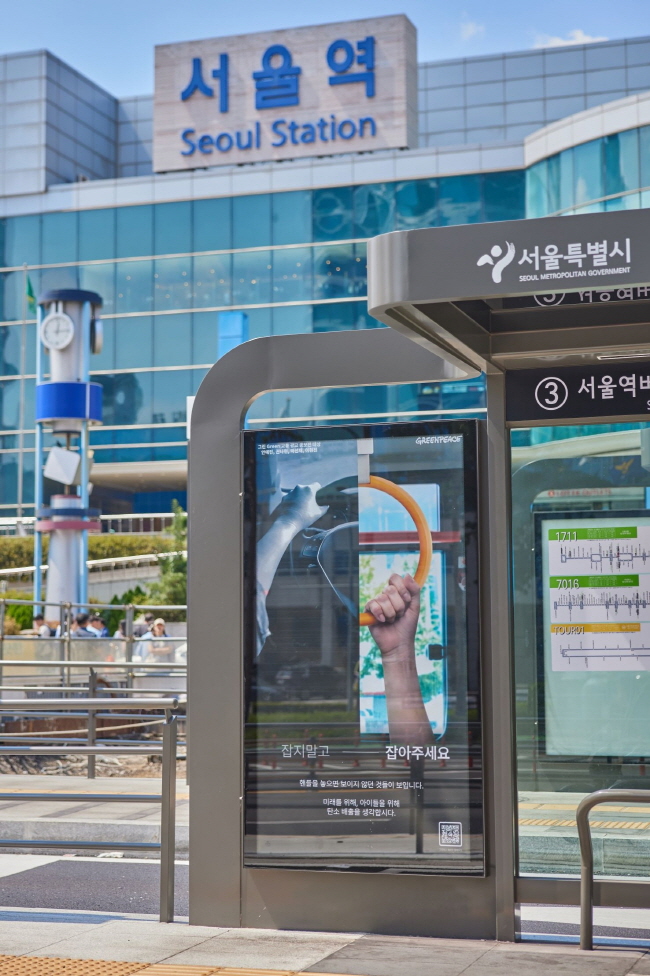
A citizen campaign demanding carbon emission reductions has caught attention in the heart of Seoul’s transport hub.
On September 2, Greenpeace announced that during the month of September, environmentally friendly transport advertisements created by citizens would be displayed at Seoul Station, Gwanghwamun bus stop, and Gangnam Station’s electronic billboards.
In preparation for ‘World Car-Free Day’ on September 22, Greenpeace has organized a ‘Green Transport Advertising Contest’ to gather creative ideas from citizens on transportation needed in the era of climate crisis. A total of 118 entries were received, with external experts such as artist Kim Mul-gil and marketers Woo Hyun-sol and Lee Seung-hee serving on the jury to select the winning works.
The winners ▲Ahn Ye-rin, Kwon Na-hyun, Park Sun-jae, and Lee Hyun-jin juxtaposed a car steering wheel with a bus handrail, encouraging a shift in thought with their slogan, ‘(Steering Wheel) Don’t grab it, (Handrail) grab it instead,’ urging consideration of carbon emissions for the future. ▲Kim Yoon-seo illustrated a burning Earth alongside a drawing of a car, warning about the carbon emissions impact of automobiles on the planet. Additionally, ▲Shin Young-jun presented an illustration that clearly compares the carbon footprints of cars, buses, and subways, emphasizing the use of public transport.
The winning works will be installed in high-traffic advertisement boards at Seoul Station, Gwanghwamun, and Gangnam Station, allowing citizens to naturally engage with the messages during daily commutes and outings, reflecting on the link between transportation methods and the climate crisis, thus prompting thoughts on carbon emissions during travel.
Winner Kim Yoon-seo expressed her thoughts: “Feeling the urgency of recent temperature changes on Earth has made me realize the necessity for change in domestic car usage, especially after observing impressive and frequent use of public transport such as bike parking areas and tram tracks abroad. I wanted to lead to a shift in perception regarding car use through the advertisement I submitted.”
The transport sector accounts for about 14% of domestic greenhouse gas emissions. The number of registered vehicles in South Korea has steadily increased over the past decade, surpassing a cumulative total of 25.94 million last year, while the share of public transport during the COVID-19 pandemic dropped significantly to just 33% as of 2022. Greenpeace is conducting eco-friendly transport campaigns aimed at reducing dependency on private vehicles and promoting alternative transportation methods such as public transport, cycling, and walking to respond to the climate crisis and enhance citizens’ mobility rights and quality of life.
Choi Eun-seo, a climate energy campaigner at Greenpeace, stated, “To respond to the increasingly serious climate crisis and create sustainable cities, changes in the transport sector are essential. Along with the transition to zero-emission vehicles, proactive policies are needed to reduce reliance on private cars and increase the use of eco-friendly public transport. I hope the voices of citizens gathered through this contest will also reach policymakers.”
Lee Sang-jin daedusj@autodiary.kr
